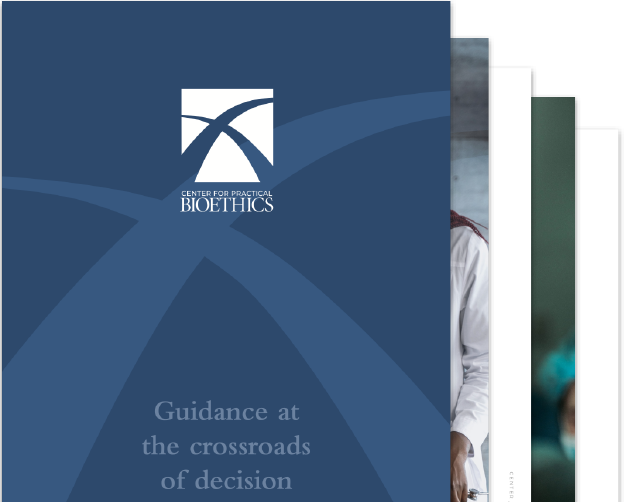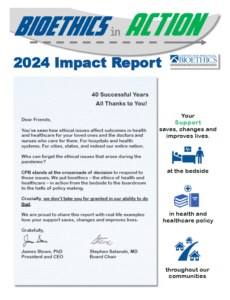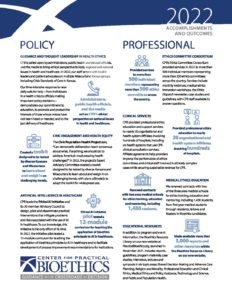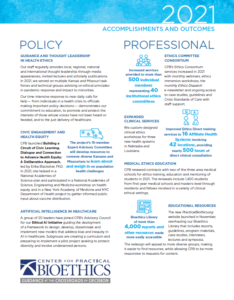Ethical discourse and action advance the health and dignity of all persons.
About the Center for Practical Bioethics

Our Vision
Our Mission
To raise and respond to ethical issues in health and healthcare.


Our Guiding Principles
- To be unfettered by special interests
- To listen actively, think critically and act wisely
- To lead and promote the leadership of others
- To collaborate with those who commit to civil discourse
- To work diligently towards our mission
Our Core Values
- Respect for human dignity.
- We believe that all persons have intrinsic worth.
- We promote and protect the interests of those
whose voices have not been heard or heeded. - We commit to the just delivery of healthcare.


Our Case Statement
The Center for Practical Bioethics (CPB), founded in 1984, is a Kansas City-based nonprofit nationally recognized for its work in practical bioethics.
Read more about the Center in our Case for Practical Bioethics.
2024 Impact Report
From providers in clinical practice to patients and families making difficult choices for themselves and loved ones, your support helps thousands each year. We take pride in the values you advance though the accomplishments described in the report.



Historical Highlights
Nearly 40 Years of Accomplishments
1984
The Center was founded by an attorney, a philosopher and a physician.
1986
Convened hospital ethics committees to launch the Kansas City Regional Hospital Ethics Committee Consortium, the oldest continuously operating consortium of its kind in the US (1986-Present).
Began publishing Midwest Medical Ethics, which became Bioethics Forum, the nation’s second peer reviewed journal on bioethics (1986-2003).
1987
Counseled both sides in the Nancy Beth Cruzan vs. Director, Missouri Dept. of Health, the first “right to die” case to be reviewed by the U.S. Supreme Court (1987-90).
Trained and consulted with more than 200 ethics committees in hospitals and health systems across the country, which included holding day-long orientations for ethics committee members and an annual conference (1987-Present)
Created and published “HIV Infection: Ethical Guidelines for Healthcare Providers,” the first voluntary community HIV standards in the U.S.
Designed and implemented the nation’s first community-wide living will project in partnership with the Kansas City Medical Society and area medical and law schools. Included training more than 300 volunteers and conducting more than 1,000 educational programs on the importance of advance care planning (1987-90).
Developed the nation’s second community-wide initiative with Hennepin County, MN, that allowed non-hospitalized patients to have Outside the Hospital Do Not Resuscitate orders honored by emergency service providers in two states, eight counties and 30 municipalities.
1989
Established Long Term Care Ethics Consortium. The Consortium collaborated with the Missouri Division of Aging in 1992 to produce “Consideration Regarding Life-Prolonging Treatment Decisions for Residents of Missouri Long-Term Care Facilities.” The Center’s Palliative Care Task Force developed a training manual for healthcare providers and Kansas. Both efforts led in January 1999 to the Kansas Nursing Home Project.
1990
Consulted with former Senators John Danforth (Missouri) and Daniel Patrick Moynihan (New York) in the development of the Patient Self-Determination Act, which became effective in 1991.
1991
With the Jackson County Public Administrator, established Project BRIDGE to ensure that, capable, people with disabilities are encouraged to participate in their healthcare decisions. In 1993, the Institute for Human Development at UMKC extended BRIDGE to serve people with disabilities without respect to their guardianship status.
1992
Collaborated with the Joint Commission on the Accreditation of Healthcare Organizations to develop and promulgate patient rights and organizational ethics standards and to produce the “Beyond Compliance” seminar and resource materials delivered in approximately three dozen cities (1992-94).
1995
Developed Pathways: A Community’s Approach to End-of-Life Care, which demonstrated that improving end-of-life care requires a multifaceted, multidisciplinary, integrated community-wide approach (1995-98).
Introduced the Flanigan Lecture in partnership with St. Joseph Medical Center with a reading from the play Patient A, based on the story of a patient who allegedly contracted AIDS from her dentist, directed by Cynthia Levin and read by actors from the Unicorn Theatre.
1998
Directed Community State Partnerships to Improve End-of-Life Care, an $11.25 million Robert Wood Johnson National Program to advance palliative care through 24 state and local coalitions (1998-2003).
Published Ethical Guidelines in Managed Mental Health. Updated 2005.
1999
Developed and launched Compassion Sabbath, providing clergy and religious leaders tools for addressing the spiritual needs of seriously ill people and their families, recognized for its innovation in Newsweek magazine (1999-2003).
Consulted with early leadership in development of the Tuskegee University National Center for Bioethics Research and Health Care and assisted in development of community outreach for the Center (1999-2000).
Served as an advisor on Bill Moyers’ PBS documentary series On Our Own Terms, viewed by more than 20 million, the largest audience in PBS history at that time, and helped to develop community outreach materials for the program (1999-2001).
Produced State Initiatives to Improve End-of-Life Care, an eight-year policy series reaching 25,000 end-of-life coalition leaders, professionals, policymakers and legislators in all 50 states (1999-2006).
Conducted “Trusting Our Differences,” a comparative study of cultural differences in end-of-life preferences, providing evidence of significant disparities and biases in care but no cultural difference in what people want (1999-2003).
2000
In collaboration with Kansas City’s Life Sciences Initiatives, established the Research Integrity Project to provide educational programming for researchers, create a work group to establish community guidelines for ethics issues and establish a consortium of 31 location IRBs.
2001
Contracted with AARP to pilot Caring Conversations® in 17 states, a program to enhance communication between family and friends about end-of-life issues (2001-02).
Contracted with Last Acts to support their Rallying Points program to improve end-of-life care in 330 communities with materials developed for On Our Own Terms (2001-03).
Co-hosted the Centers for Medicare and Medicaid Services’ first national conference on palliative care in long-term care (2001-02).
Partnered with the National Association of Attorneys General (NAAG) End-of-Life Health Care Project to frame end of life as a consumer protection issue. The Center received NAG’s President’s Award for its contribution to this effort.
2003
Collaborated with the Federation of State Medical Boards to revise guidelines for the use of controlled substances treating pain (2003-05).
With the Kansas City Regional Hospital Ethics Committee Consortium, developed a community-wide medical specialty referral service for underserved populations, which evolved into a separate organization known as MetroCare in 2007 (2003-05).
2004
Changed our name from Midwest Bioethics Center to the Center for Practical Bioethics.
Launched the Kansas City Partnership to Advance Pediatric Palliative Care to ensure growing commitment to palliative care for children with life threatening/limiting illnesses by increasing professional capacity to provide such care, educating child-serving agencies, and creating an advance care planning tool for minors, resulting in Caring Conversations for Young Adults, published in 2008 (2004-2007).
Received the Marian Gray Secundy Sankofa Award recognizing the Center’s work to improve palliative care for African Americans, presented at the Robert Wood Johnson Foundation’s national conference, “Last Miles Home.”
2005
Conducted a national roundtable and published a policy brief presenting the fundamentals of early stem cell research and ethical arguments around it as part of the Science and Ethics Literacy Project.
Launched a Medical Futility Guidelines research/policy initiative, including ethics committee training and technical assistance to more than 30 local hospitals.
Hosted special Caring Conversations® workshops, delivered thousands of free workbooks, and responded to hundreds of calls from individuals and the media in response to Terry Schiavo, a highly publicized right-to-life case in Florida.
Received multiple grants for the Medical Outreach Project on uninsured and pro bono healthcare, involving needs assessment and gap analysis in metro Kansas City.
Provided ethics facilitation for the Organ and Tissue Donation Policy Project of the New Jersey State Funeral Directors Association, culminating in a report on how funeral directors can ethically collaborate with organ procurement organizations (2005-06).
Developed and co-facilitated a capstone seminar and practicum for the Bioethics major at William Jewell College (2005-08).
Secured a contractual relationship with Saint Luke’s Cancer Center for ethics consultation and education initiatives, including Schwartz Center Rounds and Human Values Rounds (2006-14).
Began publishing Practical Bioethics (2006-08).
2006
Consulted with the Centers for Disease Control and Prevention to develop a model for health departments nationwide to integrate palliative care with chronic disease management. Piloted an end-of-life curriculum developed with CDC public health educators. Released an online education program and policy brief on advance care planning and palliative care for state directors of departments of health and aging (2006-11).
Contracted with the U.S. Dept. of Health and Human Services and RAND Institute to develop a report on advance care planning, presented to Congress in 2008.
Consulted with the U.S. Department of Health and Human Services Secretary’s Advisory committee on Human Subjects Protections and made recommendations to establish new federal protections for subjects with diminished capacity.
Developed policy guidelines to help long-term care facilities address issues regarding intimate relationships among nursing home residents, upon request of the long-term care industry.
Created and implemented Sabbaths of Hope with Mental Health America of the Heartland, a grant-funded initiative to address stigma of depression in faith communities and remove barriers of access to treatment via education and resource development for faith leaders (2006-10).
Began a three-year contractual consultation on Engagement of Faith Communities in the St. John Health-Duke Collaboration for Palliative Care: St. John Health, Detroit, MI, and Institute on Care at the End of Life, Duke University Divinity School (2006-09).
Published a book marking the 2oth anniversary of the Center-led Kansas City Regional Ethics Committee Consortium, the oldest continuously operating consortium of its kind in the US.
2007
Collaborated on launching the MA in Bioethics degree program at Kansas City University of Medicine and Biosciences.
Provided leadership for the Workgroup for Ethics in Disaster Planning with Mid-America Regional Council, focusing on regional guidelines for ventilator allocation and triage in an influenza pandemic (2007-08).
Partnered with the Federation of State Medical Boards and the National Association of Attorneys General to develop and analyze the largest U.S. database on physicians charged with mishandling or misprescribing Schedule II Controlled Substances. Published and presented findings at policy conferences (2007-08).
As part of a Balanced Pain Policy initiative, developed and distributed a curriculum to improve the treatment of pain with the American Academy of Family Physicians and a policy brief (published in Pain Medicine) to assist law enforcement agents when investigating healthcare professionals alleged to be over- or misprescribing medications (2007-08).
Helped to create a national coalition to establish National Healthcare Decisions Day on April 16, 2008.
2008
Fully endowed ($2.3 M) the Rosemary Flanigan Chair for Ethics Education and Consultation with appointment in January 2009 of Tarris Rosell, PhD, DMin.
Conducted research for Care EnTrust to survey 1,000 Missouri, Kansas and out-of-state residents on attitudes and values pertaining to electronic personal health records.
Published Caring Conversations for Young Adults.
Launched KC4 Aging in Community to develop a Kansas City prototype to address key challenges and opportunities presented by the area’s growing senior population (2008-11).
Held a conference on the ethics of national exhibits of plastinated bodies and published results in a book, Controversial Bodies: Thoughts on the Public Display of Plastinated Corpses.
2009
Began an ongoing contractual relationship with the University of Kansas Medical Center to provide ethics faculty resources for the medical school and clinical ethics consultation for KU Hospital.
Participated in the Institute of Medicine Office of Healthcare Reform discussions and IOM report on the need for a new model of care for advanced illness.
Convened internationally known scholars to discuss genetics and personalized medicine, and published a report, “Jewish Diseases and Personalized Medicine.”
2010
Piloted a Certificate in Clinical Ethics and Health Policy curriculum for healthcare professionals and members of ethics committees (2010-13).
Participated on the Institute of Medicine’s Committee on Advancing Pain Research, Care and Education, which published Relieving Pain in America on June 29, 2011.
Held a conference commemorating the 20th anniversary of the Nancy Cruzan decision.
Housed the American Journal of Bioethics (2010-2012)
Introduced Caring Conversations in the Workplace Program, providing advance care planning education and personal consultation and advocacy as an employee benefit (2010-Present).
2011
Founded the Coalition to Transform Advanced Care (C-TAC), a national effort to promote better outcomes and improved care for those living with advanced illness. C-TAC became a separate 501¢3 in 2011.
Founded the Pain Action Alliance to Implement a National Strategy (PAINS) in response to the Institute of Medicine report, Relieving Pain in America.
Contributed to KU Medical Center’s successful application for a $20 million Clinical & Translational Science Award grant and joined the Heartland Institute for Clinical and Translational Research: Frontiers leadership team. Participated in KUMC’s efforts to become an HHS~-funded clinical and translational research center (2011-2016 and 2017-2022).
2012
Transitioned executive leadership for the first time in the Center’s 28-year history as founding executive Myra Christopher assumed the Kathleen M. Foley Chair at the Center and John G. Carney became President and CEO (2012-Present).
Began leadership of a bi-state (KS and MO) effort to achieve provider adoption of Transportable Physician Orders for Patient Preferences (TPOPP), ensuring that the wishes of vulnerable patients with advanced disease across Kansas and Missouri are honored (2012-Present)
Developed and implemented a broad-based PAINS communications strategy and launched publication of a policy brief series, available at www.painsproject.org (2012-Present).
Established the annual Joan Berkley Symposium in Bioethics, recognizing the devotion of a beloved board member and honoring her insatiable curiosity and interest in bioethics (2012-Present).
2013
Launched Relieving Pain in Kansas City, a community-based pilot involving safety net clinics and a Pain Patient Advisory Board — which evolved into the Citizen Leader Group — comprised of 50 individuals living with chronic pain (2013-Present).
Expanded Transportable Physician Orders for Patient Preferences (TPOPP) and received funding through POLST to produce supporting materials.
Assumed leadership of Kansas City University (KCU) of Medicine and Biosciences’ Bioethics Department, overseeing more than 100% expansion of the dual degree (DO/MA in Bioethics) program (2013-Present).
Began co-directing the Clendening Summer Fellowship at KU School of Medicine, a competitive and stipended international research opportunity for rising 2nd year medical students (2013-Present)
Debuted live webcasting of a symposium, Ethical Frontiers in the Brave New World of Genomics and Learning Health Systems, co-sponsored with a dozen academic institutions, medical centers, hospitals and science related entities.
2014
Expanded relationships with KCU and Kansas University Medical Center with additional contractual commitments for staffing for education, clinical consultation and teaching (2014-Present).
Collaborated with KCU on launching an annual eight-part lecture series, Current Issues in Bioethics, featuring guest lecturers brought to Kansas City from across the nation (2014-Present).
Collaborated with KCPT Public Television in presenting Consider the Conversation ~ a film examining how doctors, patients and family members struggle to communicate and adequately prepare for the end-of-life journey. Also presented a follow-up workshop.
Expanded Caring Conversations in the Workplace through an agreement with United Way, more offerings at Hallmark and began working with KCP&L (2014-Present).
2015
Initiated Advance Care Planning for African American Faith Communities under a two-year grant from the John and Wauna Harman Foundation.
Responded to Medicare authorization to pay for advance care planning discussions.
2016
Kathy Greenlee, JD, former Assistant Secretary for Aging in the US Department of Health and Human Services, joined our staff as Vice President for Aging of Aging and Health Policy.
Applied for and received endorsement from the National POLST Paradigm Task Force for the KS-MO TPOPP program (2016-Present)
PAINS launched a research study exploring the relationship between primary care providers and their chronic pain patients in collaboration with the Department of Family Medicine at KU, with support from the American Academy of Family Physicians Foundation.
Implemented Advance Care Planning in African American Faith Communities, reaching 700 people in six cities at 19 events in nine churches, as well as four conferences with 500 community members attending (2016-17).
Chaired a conference and published report on Public-Private Partnerships and Conflicts of Interest.
2017
Provided intensive trainings on Serious Illness Care Planning and Transportable Physician Orders for Patient Preferences.
Distributed nearly 10,000 Caring Conversations workbooks and published a new Spanish translation.
Published “Pathways to Convergence: Examining Diverse Perspectives of Catholics on Advance Care Planning, Palliative Care and End of Life.
Guided implementation of bioethics curriculum and faculty development for newly opened Joplin campus of Kansas City University of Medicine and Biosciences.
Provided oversight on a record 77 ethics consultations for The University of Kansas Health System.
Presented a monthly community lecture series, BIOETHICS: Matters of Life and Death.
The PAINS Project completed the No Longer Silent communications campaign to promote comprehensive pain care and published “The CNN Effect: The Mediatization of Pain Policy.”
2018
Initiated a project to increase advance care planning in African American faith communities.
Assisted efforts in Johnson County, KS and Jackson County, MO to provide services to victims of elder abuse.
With the Tivoli Cinemas, held Kansas City’s first-ever bioethics film series.
Launched in-depth exploration with Cerner Corporation of the ethical implications of artificial intelligence in healthcare.
Transitioned the PAINS Project, a program of the Center since 2011, to the Academy of Integrative Pain Management.
2019
Introduced webinars and workshops for 300+ individual Kansas City Regional Ethics Committee Consortium members representing three dozen providers, and provided prompt response to members for resources to address critical, time-sensitive cases.
Began publishing a monthly resource, Health Ethics Dispatch, addressing issues and needs identified by ethics committees.
Launched the Clinical Ethics Service providing members organizations with ethics education and consultation, as well as more intensive and individualized consultation and training for Ethics + members.
Presented more than 70 professional lectures, conference, workshops, discussion groups and community talks.
Provided seven bi-state Transportable Physician Orders for Patient Preferences training, published a new Clinical Guidebook for Healthcare Providers in Kansas and Missouri, and approved guidance documents for out-of-hospital Do Not Resuscitate rules.
With Cerner, gathered 60 healthcare innovators and thought leaders who identified 360 elements of Al development and implementation needed to ensure fairness, accountability, transparency, data privacy and security, and reliability and safety.
2020
Provided more than 50 webinars and video updates on COVID-related topics, with 800+ live and thousands more asynchronous participants.
Collaborated with more than 25 local, regional and national entities helping to ensure that ethical principles were and are being embedded in plans to respond to COVID-19.
Responded, almost daily, to COVID-related and other calls for help from patients and family members in a healthcare crisis; from organizations struggling to navigate healthcare needs for clients; and from policymakers seeking background and guidance on delicate ethical matters to consider in rule and lawmaking.
2021
Using the tools of democratic deliberation and population health science, launched the Civic Population Health Project. The project team is creating a toolkit that will be used in subsequent years to convene racially, socioeconomically and geographically diverse Kansans and Missourians to engage civilly on our most pressing population health challenges.
Using a novel community-based participatory model, introduced the Ethical AI Initiative to develop curriculum, recommendations and best practices for adherence to an ethics framework for artificial intelligence in healthcare.
Expanded Clinical Consultation Services to 16 Affiliate Organizations, including two health systems in other states.
Collaborated with more than three dozen local, regional and national entities including nonprofits, governmental and civic groups.
Responded to hundreds of requests from patients and families seeking guidance through health crises and from a wide variety of organizations to help resolve client health navigation issues and to review policies on health ethics including regulation, procedures and protocols.
2022
The Center welcomed James Stowe, PhD as President and CEO, the third since our founding in 1984.
The Center expanded partnerships to provide Ethics Services, including Clinical Ethics and Ethical AI services, to healthcare and health IT providers.
The Civic Population Health Project team created a toolkit to convene racially, socioeconomically and geographically diverse Kansans and Missourians to engage civilly on population health challenges, such as chronic disease, infant mortality and substance misuse.
The Ethical AI Initiative’s 20-member Advisory Council recommended and tested a 12-module curriculum for teaching the application of bioethics principles to the development and use of AI systems in healthcare and to facilitate the development of process improvement recommendations for institutions.
The Advance Care Planning in the Latino Community Project provided ACP workshops and resources in Spanish in collaboration with El Centro to increase Latino ACP utilization, reduce harm, increase self-advocacy, and address longstanding disparities and inequities in accessing patient-centered care.
We renewed long-standing relationships with area medical schools in training students in bioethics and with The University of Kansas Health System overseeing the hospital’s ethics consultation service and its ethics committee.
We continued our long tradition of engaging the public in educational experiences, including the Flanigan Lecture, Berkley Symposium, Annual Event, and Advance Care Planning webinars.
We are creating new resources, including blogs, newsletters and interviews free to the public, as well as exclusive content for Ethics Services partners, including webinars, workshops and the monthly Ethics Dispatch Newsletter.
The Board approved and published a Land & Labor Acknowledgment, recognizing that the Center occupies ancestral land of indigenous tribes, acknowledging the legacy of slavery in our region, and recognizing that racist ideologies and practices remain with us today.
THANK YOU FOR MAKING HEALTH ETHICS MATTER
Ethical discourse and action advance the health and dignity of all persons.


